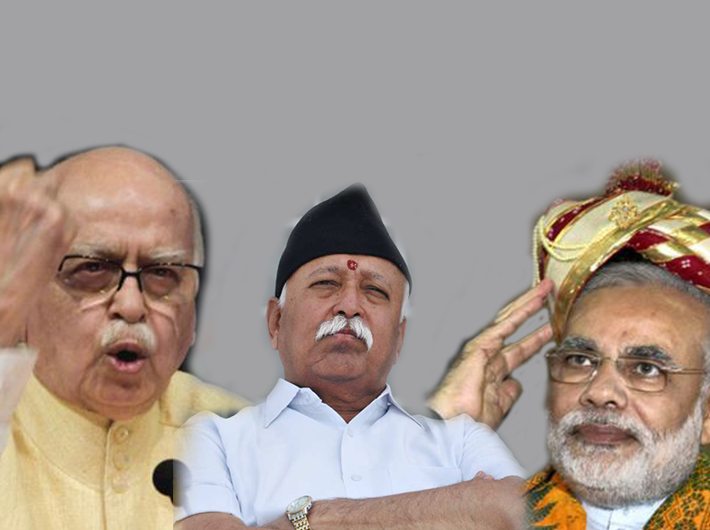RSS opted for Modi, and not Advani, because political issues he articulates and the strategy he has deployed has brought out Sangh agenda to the fore once again
The Rashtriya Swayamsevak Sangh (RSS) has been in existence for close to nine decades since its formation in 1925. In this period it has come to head a maze of organisations, or affiliates, that comprise what is loosely referred to as the Sangh Parivar.
One section of its critics and ideological adversaries contend that the RSS heads a hydra-headed monster with the parent body having little or no control over various wings that have mushroomed over the decades. Another group of antagonists say the Sangh presides over a rigid totalitarian organisation in which its word is the final. Like always, the reality alternates between the two situations, underscoring that despite attempts of its founders, the RSS is not a monolith and the Sangh Parivar is more akin to a saffron coalition.
Insiders and sympathisers have a different way of looking at this political matrix. They contend that the Sangh Parivar is not top-down hierarchical in nature. Instead, there is a symbiotic relationship with the affiliate and consultation is the norm rather than the parent body giving directives. But there have been several instances to suggest that in the final analysis the Nagpur-based leadership of RSS is the Big Brother.
In fact, RSS leaders expressed disdain at the BJP for deviating from Jana Sangh’s legacy when it was carved out of the debris of Janata Party in the early-1980s. No effort was made to control the party mainly because there was literally nothing to control. After becoming party president in 1986, Lal Krishna Advani revived samanvaya samitis – or coordination committees – that were abandoned during Atal Bihari Vajpayee’s tenure.
The RSS began exerting influence on BJP not by direct interference of the top brass but by deputing key pracharaks in the party. KN Govindacharya and Narendra Modi were among the first ones to move laterally into the BJP. Whenever RSS leaders wanted to influence key decisions of the BJP, they did so either through pracharaks or in the course of consultation with BJP leaders.
ALSO READ: How and why Modi model spells trouble for many
The first time the RSS used coercion while dealing with BJP was in 1998, when Vajpayee had a midnight visitor in the form of KS Sudarshan. He carried the diktat that Jaswant Singh and Pramod Mahajan should not be made ministers in the NDA government – ostensibly because the duo had lost the polls but mainly because they had fallen out with the RSS leadership. By this publicised visit, RSS leaders signalled to cadres that Nagpur housed the actual power-wielders in the saffron fold.
Atal a total no-no, Advani no, Modi yes. But why?
Relations between the RSS and BJP were at its lowest ebb during the Vajpayee years, as after the initial period he came into his own and took firm control of the party and kept affiliates in the leash. He lost out to the RSS in 2002 when he failed to secure Modi’s resignation after the Gujarat riots but thereafter, on most matters of governance, most of his political decisions remained within the Nehruvian realm. On the economy front, he did not reverse economic liberalisation, much to the chagrin of swadeshi votaries.
Advani’s detachment with RSS began with his pro-Jinnah comments in 2005 that eventually led to his resignation as party president, and finally as leader of opposition in 2009. Both decisions were thrust on him by Big Brother. In the first instance, the pain was not acute because Sudarshan – despite his personal brashness compared to his predecessor, Rajendra Singh (Rajju Bhaiya) – was almost a contemporary of Advani.
In contrast, Mohan Bhagwat was more than two decades younger and among his first unstated missives to the one-time strongman was that it was time for him to hang up his boots.
In October 2011, when Advani began the anti-corruption Jan Chetna Yatra much to Modi’s dislike, the RSS leadership privately voiced bemusement at the octogenarian’s suo motu decision, but left it to Modi to discomfit his former guru when the yatra arrived in Gujarat.
The RSS’s decision to be more decisive this time – in regard to Modi’s appointment – has not been taken because the Gujarat chief minister endeared himself to Bhagwat and his supporters within RSS. The RSS opted for Modi, and not Advani, because political issues he articulates and the strategy he has deployed has brought out the Sangh agenda to the fore once again.
It is because of the pressure from Modi, and his decision to launch his campaign on Shyama Prasad Mookerji’s death anniversary, that Advani mentioned after a long gap the demand to abrogate Article 370 of the Constitution.
Modi may not have hopped, stepped and jumped on to the ‘akharas’ of Ayodhya as yet but there is no mistaking that it is just a matter of time before he raises the issue of Ram temple. After all, his strategy is to break from the middle path of Vajpayee that was continued by Advani and his successors in the party.
Modi is leading the BJP into untested waters and is playing a high-risk game. His elevation has already ensured the parting of ways between BJP and Janata Dal (U) and in all likelihood will not enable the BJP to forge pre-poll alliances with any other party besides those that remain in the rump still being called the National Democratic Alliance.
For the RSS, the biggest gain from Modi becoming chief of the campaign committee is that the core Hindutva issues are back in the national political discourse – while it may not be with the vehemence of yore, at least a beginning has been made. The BJP with Modi at helm has got back to the situation of ‘splendid isolation’ of the pristine Advani era.
It is at this point that the goals of RSS and Modi begin differing. For the latter, the next election is almost a make or break situation. Even if he does not become prime minister in 2014, Modi would want another shot at the post at the earliest. If the BJP does poorly in the polls, it will begin Modi’s political decline.
But regardless of the verdict, the dominant RSS leadership looks at the political scenario from a more long-term perspective. In the past there has been no love lost between Modi and them. They also have no illusions about Modi being capable of rendering the RSS redundant in the event of securing a huge political mandate. The best hope for the RSS brass is that Modi’s gamble in pursuing the anti-Nehruvian strategy pays off in a limited way so that he can be kept in check to some extent. It would be any day better than the Advani path that would be a repeat of the Vajpayee era – a phase when barring India going nuclear, there was little long-term takeaway for the RSS.
Other battles, especially with Modi, can be kept back for another day.



